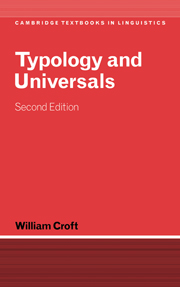Book contents
- Frontmatter
- Contents
- List of figures
- List of tables
- Preface to the second edition
- Preface to the first edition
- List of abbreviations
- List of symbols
- 1 Introduction
- 2 Typological classification
- 3 Implicational universals and competing motivations
- 4 Grammatical categories: typological markedness, economy and iconicity
- 5 Grammatical hierarchies and the semantic map model
- 6 Prototypes and the interaction of typological patterns
- 7 Syntactic argumentation and syntactic structure in typology
- 8 Diachronic typology
- 9 Typology as an approach to language
- List of references
- Map of languages cited
- Author index
- Language index
- Subject index
Preface to the second edition
Published online by Cambridge University Press: 05 June 2012
- Frontmatter
- Contents
- List of figures
- List of tables
- Preface to the second edition
- Preface to the first edition
- List of abbreviations
- List of symbols
- 1 Introduction
- 2 Typological classification
- 3 Implicational universals and competing motivations
- 4 Grammatical categories: typological markedness, economy and iconicity
- 5 Grammatical hierarchies and the semantic map model
- 6 Prototypes and the interaction of typological patterns
- 7 Syntactic argumentation and syntactic structure in typology
- 8 Diachronic typology
- 9 Typology as an approach to language
- List of references
- Map of languages cited
- Author index
- Language index
- Subject index
Summary
This second edition of Typology and universals is almost completely rewritten from the first edition. Although the number of chapters and much of their content remains the same, many major changes have been made, largely due to the maturing of typology as an approach to language. The most important innovation is the systematic employment of the semantic map model, now widely used in typological research. Also, I have reorganized the material so that typological generalizations and their explanations are now more closely integrated.
Typology has also developed an independent institutional identity in the past decade. There is now a journal, Linguistic Typology, and an international association (the Association for Linguistic Typology [ALT]) with biennial conferences. A Max Planck Institute for Evolutionary Anthropology has been established in Leipzig, Germany, with a typologically oriented linguistics section under the direction of Bernard Comrie. These institutional developments also reflect a shift in the center of gravity in typology from the United States to Europe. Major typological studies have been published in the last decade or so by scholars based in Europe (including Russia, long a center of typological research). Some of this shift is reflected in this edition and in the references in the Bibliography.
This edition has benefited from the input of students in ten years of classes in typology at the University of Michigan and the University of Manchester, as well as shorter courses at the LSA Summer Institute in Albuquerque, New Mexico, USA in 1995, the Summerschool of the German Linguistics Society, Mainz, Germany in 1998, and the LOT Winterschool in Leiden, the Netherlands in 2000.
- Type
- Chapter
- Information
- Typology and Universals , pp. xv - xviPublisher: Cambridge University PressPrint publication year: 2002



